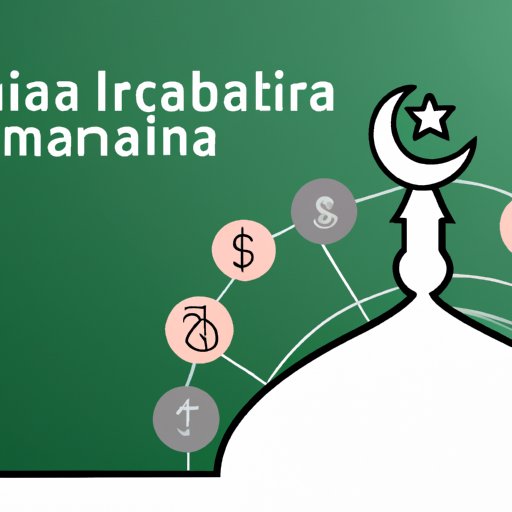Introduction
Islamic banking is a financial system that adheres to Sharia law and is based on principles of fairness, transparency and ethical behaviour. This type of banking is based on the concept of risk-sharing rather than interest-based transactions, and it has become increasingly popular in recent years. In this article, we will explore how Islamic banks make money, examining the different types of investments they can make, the profit and loss sharing agreements they use, and the regulatory framework governing the industry.

Exploring the Role of Interest in Islamic Banking
In Islamic banking, interest (known as riba) is prohibited, which means that traditional banking practices such as lending money with interest are not allowed. Instead, Islamic banks focus on promoting risk-sharing between the bank and its customers. This is done through a variety of different investments and profit and loss sharing agreements.
Analyzing the Different Investment Opportunities Available to Islamic Banks
One way that Islamic banks make money is through investing in stocks, bonds and mutual funds. These types of investments are allowed under Sharia law as long as they do not involve speculation or gambling. Islamic banks are also able to invest in real estate, commodities and derivatives, although these investments must comply with Sharia law.

Examining the Profit and Loss Sharing Agreements Used by Islamic Banks
Another way that Islamic banks make money is through profit and loss sharing agreements. The most common of these agreements are the Mudarabah, Musharakah and Murabahah agreements. In a Mudarabah agreement, the bank provides capital to an entrepreneur and receives a share of any profits generated. In a Musharakah agreement, the bank and the customer agree to share both profits and losses associated with a business venture. Finally, in a Murabahah agreement, the bank purchases goods on behalf of the customer and charges a mark-up fee for its services.

Investigating the Profitability of Islamic Banks Compared to Conventional Banks
It is difficult to compare the profitability of Islamic banks with conventional banks, since each type of bank operates differently. However, there are some advantages to investing in Islamic banks. For example, investors can benefit from lower transaction costs and greater transparency. Additionally, Islamic banks are seen as more socially responsible, as they promote sustainable business practices and support local communities.
Understanding the Regulatory Framework of Islamic Banking
The regulatory framework of Islamic banking is governed by both Sharia law and central bank regulations. Sharia law dictates what kinds of investments and activities are permissible, while central bank regulations determine the minimum capital requirements and other operational rules. This ensures that Islamic banks are held to the same standards as conventional banks.
Comparing Islamic Bank Fees with Those of Conventional Banks
When comparing Islamic bank fees with those of conventional banks, it is important to consider the cost of services offered by each type of bank. Generally speaking, Islamic banks tend to charge higher fees for their services than conventional banks. However, these fees are often offset by the lower transaction costs associated with Islamic banking.

Exploring the Impact of Social Responsibility on Islamic Banking Profits
Finally, it is worth noting that Islamic banks are increasingly focused on promoting social responsibility. This includes encouraging ethical business behaviour, supporting local communities and promoting sustainable business practices. These activities can have a positive impact on the profitability of Islamic banks, as they can attract new customers and help to build trust in the banking sector.
Conclusion
Islamic banking is an increasingly popular and profitable form of banking, and it is based on principles of fairness, transparency and ethical behaviour. By understanding the different investment opportunities available to Islamic banks, the profit and loss sharing agreements they use, and the regulatory framework governing the industry, we can gain a better understanding of how Islamic banks make money. Additionally, Islamic banks are increasingly focused on promoting social responsibility, which can have a positive impact on their profitability.
(Note: Is this article not meeting your expectations? Do you have knowledge or insights to share? Unlock new opportunities and expand your reach by joining our authors team. Click Registration to join us and share your expertise with our readers.)
